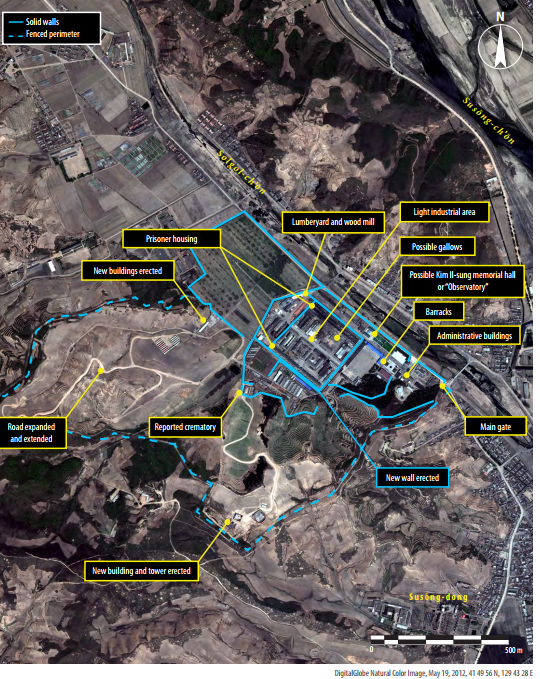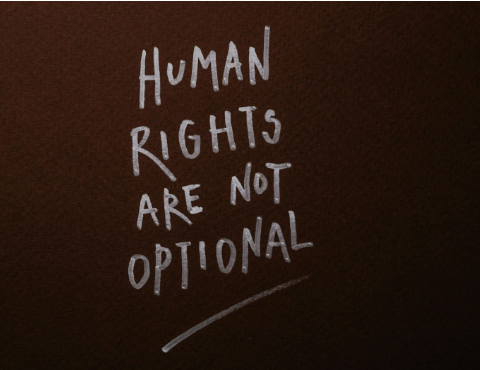By Cecilia Moore and Holly Boggs
On January 28, Google Maps laid out a detailed depiction of North Korea for the first time in history. Aside from a marker over its capital city Pyongyang, the country had previously been an empty space. And then in an instant, virtual-world North Korea had details of cities, roads, and national monuments dotting its previously white space. Yet above all else, one new aspect of the map garnered the most media attention: political prisoner camps.
Most Western news sources depict North Korea as being led by an oppressive regime that follows an irrational line of behavior and commits numerous horrific crimes against humanity towards its own brainwashed populace. The media wields the enormous power of alerting the world to dire human rights situations. It is widely accepted among the Western media that millions of people in North Korea are starving, denied freedom of speech, and forced to work long hours of hard labor, and that this unrelenting regime is the cause of this internal strife. However, despite this common narrative, there is merit in analyzing this issue with an open mind and a blank sheet of paper. In fact, some in the diplomatic community believe this is the only way the North Korea situation can be addressed.
The University of Georgia happens to house one of the world’s leading scholars on North Korea, and he promotes such an attitude toward the country. Dr. Han Park, a professor in the School of Public and International Affairs and the director of the Center for the Study of Global Issues, has cultivated favorable diplomatic relations with North Korea by playing the role of the truth-seeking academic. Fascinated with understanding the people of North Korea, he strongly advocates for demystifying any ethnocentric preconceptions of the state in order to develop peaceful relations. This viewpoint is extremely important in understanding the complexities of North Korea’s actions, and it is through this reasoned, open-minded framework that North Korea’s intentions and U.S.-North Korean relations will be analyzed.
For the United States, the primary focus of their diplomatic negotiations with North Korea centers on the country’s nuclear program. Simply put, the United States does not want North Korea to be a nuclear power. From the North Korean government’s perspective, however, the international community has backed them into a corner by demanding that they dismantle their nuclear program. According to Dr. Park, “We say to them, ‘give up your only leverage,’ which are their nuclear weapons, ‘and then we will talk.’ They can’t do that.” Nonetheless, when the United States’ strict demands to denuclearize are not met, North Korea is slapped with even more sanctions, further isolating their economy and pushing them to commit more belligerent actions.
In addition to North Korea’s desire for leverage, its nuclear program is also spurred by the wartime economy it promotes. The Korean War did not end in peace. A ceasefire was signed sixty years ago that left American troops stationed in South Korea, and even American nuclear weapons remained in South Korea until 1991. This has made North Korea weary of future attacks. With the Cold War unfolding throughout the 20th century and enemy nuclear weapons stationed just below them, North Korea felt a sharp need to increase its defenses, thus explaining the military-industrial focus that persists within the country today.
It is in the name of national security, that the North Korean government defends its domestic atmosphere. There are countless instances of nations infringing on the rights of their citizens’ during times of war. Even the United States has had numerous examples of such violations, such as the Japanese-American Interment Camps, which stemmed from wartime anxiety. North Korea, which considers itself still under the threat of war, validates their human rights abuses with this reasoning. Furthermore, due to its past and present human rights violations, the North Korean government-sponsored news agency discredits the United States’ attention to global abuses as a “politicization of human rights” and an “application of double standards and selectivity and arrogant admonition.”
Even though there is a large amount of data verifying human rights abuses in North Korea, Dr. Park warns readers to take these stories with a grain of salt. “The only first person, non-government-filtered view of North Korea currently available to the world comes from these people who fled North Korea. They have a bad relationship with the government, and it is very possible that it would serve their best interests to embellish their stories to further demonize the North Koreans.” Dr. Park proposed the idea that perpetuating the notion of North Korea as an evil regime incapable of negotiation has been politically and economically advantageous to both the United States and South Korea. The United States has invested billions of dollars in funding joint military exercises with South Korea and in developing missile defense technologies that are set to be stationed in East Asia to counter an impending nuclear-capable North Korea. If the threat of North Korea dissipated, then all of this investment would be for naught.
Similarly, Dr. Park purports that the United States and the region’s powers might want North Korea to be a threat in order to bolster their own power. Protecting U.S. allies in the region from the threat of North Korea gives the United States a legitimate reason to maintain a foothold in this region of the world. Furthermore, the Six-Party Talks that are being conducted between the United States, China, South Korea, Japan, Russia, and North Korea to discuss the conditions of North Korean denuclearization give virtually all these countries political sway within the region which they do not wish to readily relinquish. For the United States, this could also be a strategic move in relation to China, as the United States wants to keep up their military presence in the region as a check on China’s power ascension.
As has been shown, relations with North Korea are extremely complicated. First, very few outsiders actually know what conditions are like inside North Korea’s borders; thus the motives of the regime are often shrouded in mystery. Also, the United States frequently approaches negotiations with North Korea along a hard-lined stance that easily leads to gridlock. Last, it is possible that the motives behind the United States’ involvement in East Asia are more driven by a desire to create a power complex rather than a necessity to abate a standing one.
Regardless, even through this complex web of interactions, the initial focus on human rights issues that stemmed from the Google Maps story is still important. Dr. Stacey Mitchell, a professor at the University of Georgia and an expert on human rights, said that human rights violations and their consequences can be seen through two different perspectives- statism versus cosmopolitanism. The first view is that nations as sovereign beings determine human rights. When it comes to human rights, countries take into consideration their own national interests first, and when these do not coincide with human rights obligations they will not act. On the other hand, there is the view that everyone in the global community is deserving of the same level of human rights, and when different peoples, regardless of their ethnicity, nationality, age or gender, experience abuses, the global community should rise in their defense.
National leaders around the globe often adopt this first perspective. However, the second perspective is of particular theoretical importance. As Dr. Mitchell noted, “If we want international law to mean anything, then we have to care.” If the media did not disseminate information on these issues, and if NGOs (non-governmental organizations) around the world didn’t investigate and develop campaigns against these violations, then the vast majority of human rights breaches would be completely neglected, and all the internationally supported laws and treaties passed would have less meaning. So while human rights violations are not the only things that the United States should focus on while defining a relationship with another nation, their advocacy is crucial.
There is no one answer to the North Korean conflict. If anything, there are just more and more questions. North Korea’s regime and the ideology surrounding it are extremely unique and misunderstood by most. Even China, their closest ally, is often blindsided by the actions and positions North Korea takes. But perhaps the world has been given a new vantage point from which it should view North Korea. From the perspective of Google Maps, North Korea is a country of cities, roads, national monuments, and political prison camps. If American policy makers wipe away preconceived notions and political agendas, and begin their studies anew with this basic knowledge and a desire to understand North Korea, then a chance to improve relations might exist.



